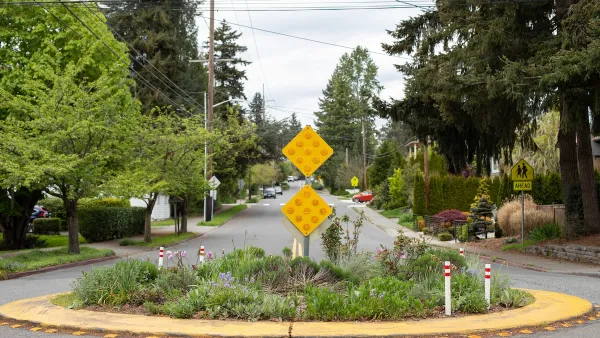"Shared streets" guru Ben Hamilton-Baillie has shown in the U.K. that there are a lot of better ways to manage traffic than stoplights. CNU asked Ben, as he prepares to come to the United States, if shared streets could work here.

"I am convinced that the principle of shared space and low-speed, civilised streets could be beneficially applied in North America," said Hamilton-Baillie in the interview. "Although the urban form, scale and context is often very different – and often particularly challenging! – human psychology is the same everywhere. And it is working with the grain of human behaviour and interaction which lies at the heart of shared space."
The Town of Ponyton, UK is one of Hamilton-Baillie's success stories. A video about the town's transformation can be seen here. The video shows the importance of paving materials and other subtle cues that slow traffic and make it possible to combine people, bikes and traffic safely.
"Just as in architecture, paving materials help convey values, priorities and purpose," says Hamilton-Baillie. "Recent street design has often been limited to a very limited palette of asphalt or concrete. Whilst these are excellent materials, we often use a much wider range of paving materials such as blocks, setts or cobbles, materials that can respond to the buildings or surroundings, and which can influence behaviour through our visual, auditory and tactile senses. Blocks often suggest lower speeds, and can be useful to contrast with more linear elements of streets. But we also use surface applications, paints, bonded gravel – anything that helps tell a rich story."
Ben Hamilton-Baillie will be sharing his experience with shared streets on June 6th at CNU 22 in Buffalo, New York.
FULL STORY: Talking with Ben Hamilton-Baillie About Shared Streets

Planetizen Federal Action Tracker
A weekly monitor of how Trump’s orders and actions are impacting planners and planning in America.

Chicago’s Ghost Rails
Just beneath the surface of the modern city lie the remnants of its expansive early 20th-century streetcar system.

Amtrak Cutting Jobs, Funding to High-Speed Rail
The agency plans to cut 10 percent of its workforce and has confirmed it will not fund new high-speed rail projects.

Ohio Forces Data Centers to Prepay for Power
Utilities are calling on states to hold data center operators responsible for new energy demands to prevent leaving consumers on the hook for their bills.

MARTA CEO Steps Down Amid Citizenship Concerns
MARTA’s board announced Thursday that its chief, who is from Canada, is resigning due to questions about his immigration status.

Silicon Valley ‘Bike Superhighway’ Awarded $14M State Grant
A Caltrans grant brings the 10-mile Central Bikeway project connecting Santa Clara and East San Jose closer to fruition.
Urban Design for Planners 1: Software Tools
This six-course series explores essential urban design concepts using open source software and equips planners with the tools they need to participate fully in the urban design process.
Planning for Universal Design
Learn the tools for implementing Universal Design in planning regulations.
Caltrans
City of Fort Worth
Mpact (founded as Rail~Volution)
City of Camden Redevelopment Agency
City of Astoria
City of Portland
City of Laramie





























